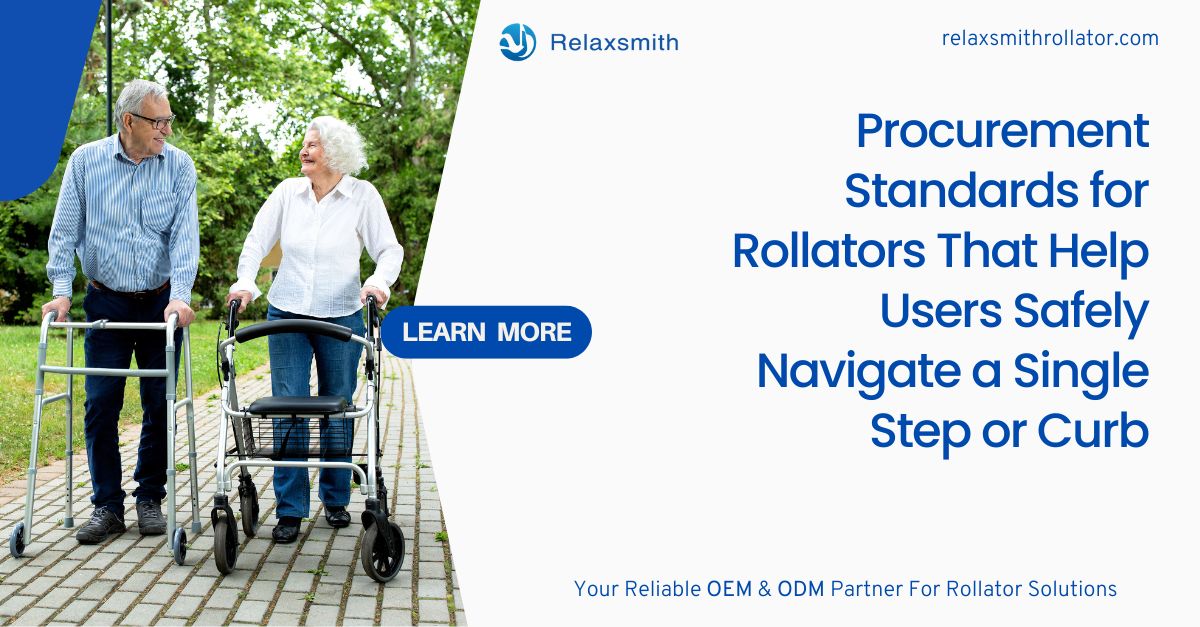Procurement Standards for Rollators That Help Users Safely Navigate a Single Step or Curb

Choosing a rollator that helps users safely navigate a single step or curb with rollator involves more than visual inspection or price comparison. Procurement and sourcing professionals must evaluate each model based on performance, compliance, and safety benchmarks. This guide outlines the procurement checklist used by top-tier healthcare, long-term care, and rehabilitation organizations to qualify mobility aids that meet curb transition requirements.
Step and Curb Safety Specifications
Minimum Curb Height Performance: Must clear at least 3 inches without wheel lock disengagement.
Dynamic Load Testing: Certify stability under 300 lb weight when transitioning a curb.
Brake Activation Distance: Brake should engage within 0.75 seconds of grip squeeze on incline.
Rear Wheel Traction: Poly-tread or grooved rubber required for uneven surfaces.
Frame Stability and Balance Criteria
To safely navigate a single step or curb with rollator, units must have structural geometry that enhances weight balance. Check for:
Frame Width: 22–26 inches, depending on user height and step risk profile.
Curb Pedal: Mandatory for facilities purchasing more than 20 units; helps lift front wheels easily.
Joint Rigidity Test: Ensure no more than 1° frame twist under 50 lb side force.
Documentation and Manufacturer Requirements
Compliance Docs: Must include ISO 11199-2, curb mobility field test log, and weight limit validation sheet.
Warranty: At least 3 years for frame and 1 year for brakes and wheels.
Instructional Content: Supplier must offer training modules or videos on curb navigation safety.
Decision Flow for Sourcing Teams
Rollators that safely navigate a single step or curb with rollator are integral to patient recovery and staff efficiency. Procurement teams can use this simplified qualification process:
Request full technical specification sheet and test data
Shortlist models meeting dynamic curb clearance thresholds
Conduct hands-on test with simulated step environment
Score vendors on compliance, serviceability, and training
Approve supplier contract with revalidation clause every 2 years
Conclusion
Sourcing the right rollator goes beyond aesthetics and upfront cost. For facilities where users must safely navigate a single step or curb with rollator, procurement must involve clinical testing, mechanical criteria, and operational readiness documentation. When these are aligned, both user safety and facility compliance are assured.
SEO Keywords (40 groups for this series)
safely navigate a single step or curb with rollator
curb mobility procurement standards
ISO 11199-2 compliant rollator
step height testing mobility aid
frame balance sourcing checklist
curb pedal specification
rollator sourcing QA document
brake engagement test spec
side force resistance rollator
treaded rear wheel requirement
training module mobility vendor
warranty term rollator contract
mobility aid tender checklist
curb descent procurement SOP
rehab facility rollator approval
rollator buyer safety audit
mobility transition test doc
approved supplier mobility aid
curb climb frame integrity
dynamic load mobility test
contract review sourcing walker
urban rehab mobility aid spec
procurement criteria rollator
staff training vendor mobility
brake timing benchmark
public curb mobility qualification
curb navigation capability test
safe walker sourcing requirement
certified rollator selection
best practice purchase walker
mobility compliance vendor audit
technical spec review mobility
facility rollout rollator
mobility user safety contract
assistive product test protocol
curb assist pedal sourcing
healthcare tender curb safety
step test approval process
field-tested mobility equipment
procurement audit guide walker
Tags:
safely navigate a single step or curb with rollator, curb mobility procurement standards, ISO rollator compliance, step transition audit walker, sourcing safe mobility aid, vendor tender wheelchair












